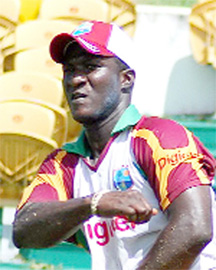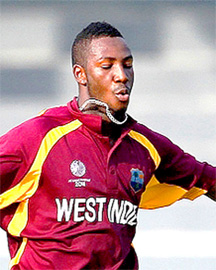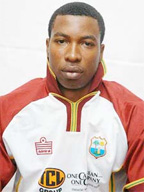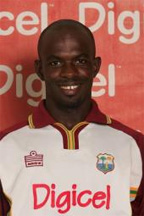By Tony Cozier
At the ICC World Cup
In CHANDIGARH
As satisfying as Friday’s comfortable, if hard-fought, victory over the feisty Irish, was West Indies head coach Ottis Gibson would have been just as delighted with those who contributed most.

They weren’t the usual suspects. Instead, lesser lights still to establish themselves made the difference – Devon Smith and Kieron Pollard with the bat and, in Pollard’s case, in the field with a critical, stunning catch, captain Darren Sammy and Andre Russell, in his first ODI, with the ball.
Chris Gayle, who so regularly dictates the course of the innings from the top, was absent with an abdominal strain and all-rounder Dwayne Bravo, Gibson’s “energiser”, had long since departed to have his damaged knee repaired.
Shivnarine Chanderpaul, promoted to the opening position where he once thrived in the 50-50 game, and Ramnaresh Sarwan, a class act with an ODI average of over 40, pottered around for 45 runs between them off 81 balls.
Darren Bravo, the dashing No.3, had his middle stump knocked over third ball by a beauty.
When it came to defending their 275 total, Kemar Roach could not find the length that had earned him 10 wickets and two Man of the Match awards in preceding matches.
Such a combination placed the onus on others and, even given that the opposition has only associate status, they responded in a way that hints that a team, rather than a collection of individuals dependent on too few, is starting to emerge. The innings was going nowhere after 32 overs at 130 for the wickets of Chanderpaul, Bravo and Sarwan when Pollard arrived in an elevated position of No.5.

He proceeded to do what he has done so repeatedly for several teams in the Twenty20 game, carrying Smith along in his slipstream in a partnership of 88 off 10 overs, 55 of them off the five overs of the perfectly timed batting power play between overs 35 and 40.
Smith patiently stuck to orders that he should try to bat through the innings to avoid early exposure to a lengthy lower order caused by Gayle’s absence.
He held the innings together until Pollard joined him to provide the necessary propulsion in the last third of the innings, recording his first ODI hundred, without a blemish.
Pollard’s immense global reputation is entirely as a power-hitting enforcer in the confines of the Twenty30 format.
His 94 off 55 balls, with five sixes (one with only one hand on the bat) and eight fours as the highlights, was increasing, if not yet conclusive, proof that he is capable of such destruction in the longer game as well.
The big Trinidadian is neither the most elegant nor most technically correct of batsmen.
But he has the ability to hit the ball as hard and as far as anyone in the contemporary game.
He also has a first-class top score of 174 and an average of 38, better than many who have gained Test places ahead of him.
A couple of television commentators at the current World Cup – Tom Moody, the former Australian Test player and Sri Lankan coach, and Robin Jackman, the England seam bowler of the 1980s – liken him to the Australian Andrew Symonds.

A similarly belligerent batsman, serviceable medium-pacer and top-class fielder, Symonds spent four years pigeon-holed as a limited-overs player before, given his chance at Test level, he became a regular in the teams that so dominated international cricket in the last decade.
Pollard’s problem, unlike Symonds’, is that he has played only Twenty20 cricket over the past two years. His last first-class match was for Trinidad and Tobago in the regional 2008 season.
He needs more practice at that level to redevelop his longer game but that may not be possible, given his demand in the Indian Premier League, the Australian Big Bash and the county Twenty20 in England.
Smith, an underachiever in the eight years since he first appeared for the West Indies as a 21-year-old, was unlikely to have been in the eleven had Adrian Barath not been eliminated from the original squad after tearing a hamstring.
His goal, predicated by Gayle’s withdrawal and replacement by Russell, a bowler, was to bat through the innings as there was reasonable concern of the effects of the loss of top order wickets on such shortened batting.
Smith remains limited in his range of strokes and was initially inhibited by disciplined bowling and outstanding fielding. Nor was he aided by the inactivity of Chanderpaul and Sarwan at the other end but he never lost sight of his mission, carrying on to his first hundred in 36 ODIs.
Sammy was made captain by default last November after the incumbent Gayle and his deputy Dwayne Bravo declined to sign retainer contracts with the West Indies Cricket Board (WICB). He needed to perform to prove that he merited a place in the team that was never guaranteed.
The doubters are critically monitoring his every move. They would have had little to quibble about on Friday.
His third ball dismissal to a catch into fine leg’s lap came when quick runs were required over the last seven overs. It was his probing medium-paced bowling, and his innovative field placings, that had the most impact.

He began with three successive maidens to halt Ireland’s fast start, frustrating their captain William Porterfield into chipping a catch to mid-on.
His later victims were Kevin O’Brien, the potential match as he was against England, taken by the sprawling Pollard chasing in from long-on, and George Wilson, lbw on umpire Ashoka deSilva’s call of referred lbw with the batsman’s bat locked in behind the pad.
Sammy’s figures of 10-3-31-3 accurately reflected his steady stint. A few runs with the bat would now be a useful adjunct.
On ODI debut, Russell was introduced at a difficult time when left-handers Porterfield and Ed Joyce were together in a rapidly burgeoning stand.
From a bounding, rhtymical approach, he proceeded to bowl with pace and wicket-to-wicket control, spruced up with the occasional sharp, well-directed bouncer that once clattered left-hander Niall O’Brien’s helmet. The searing yorker he produced to scatter the stumps with Joyce on the go with 84 off 106 balls, just about determined the outcome.
It left Ireland 177 for four midway through the 38th over, still 99 short of their winning goal. Sulieman Benn then returned to take care of the lower order.
The result maintained the phenomenal net run rate the West Indies have achieved after demolishing the Netherlands by 215 runs and Bangladesh for 58 in a nine-wicket win.
They now finish the group stage with two difficult matches against England on Thursday and India on Sunday in Chennai, but are likely to advance to the quarter-finals.
After that, with everyone given an individual boost to his confidence, a couple of good days can see them through the final.
As Gibson warns, let’s not get ahead of ourselves.





